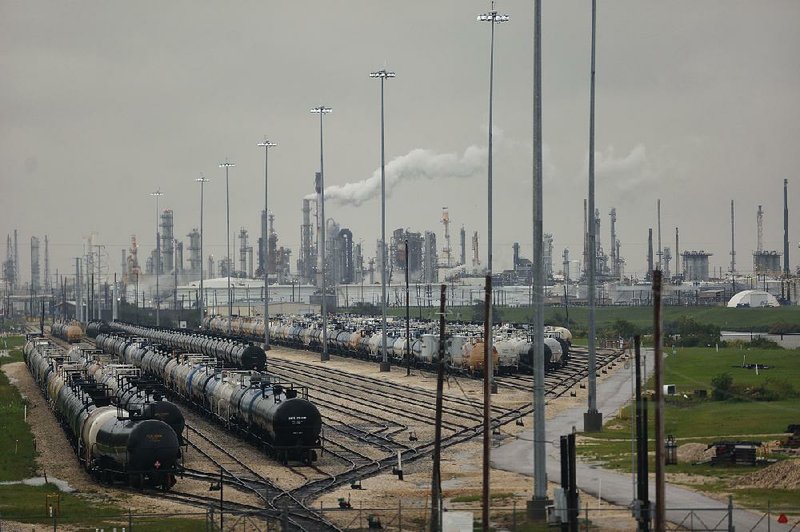America's largest oil refinery is joining the spate of shutdowns in the face of Tropical Storm Harvey's apocalyptic rains, potentially reducing U.S. fuel-making capacity to the lowest level since 2008.
Motiva Enterprises LLC's Port Arthur facility, the largest in the United States, is shutting because of severe flooding, according to a person with knowledge of the plant's operations who didn't want to be identified because the information isn't public. Motiva, owned by Saudi Arabia's national oil company, said in a statement that the plant was operating at about 40 percent of its 605,000-barrel-a-day capacity.
It joins more than a dozen other plants in Texas with combined capacity of more than 4 million barrels a day that have slowed production since Harvey approached the coast late last week. That amount of offline capacity could reduce U.S. fuel production to the lowest since Hurricane Ike shut several refineries after striking the Texas coast in 2008. Gasoline futures have jumped to the highest in more than two years, and the fuel's premium to crude oil has risen to a 16-month high.
"These closures are already impacting markets with crude prices lower on a perceived drop in demand and gasoline prices spiking in response to lower supply," Sandy Fielden, director of oil and products for Morningstar Commodities Research, said in an emailed note.
The first refineries to close were those in Corpus Christi, near where Harvey initially made landfall on Friday. The winds quickly slowed to a tropical storm from a Category 4 hurricane, and the danger shifted to flooding as the storm dumped more than 50 inches of rain over parts of Houston. The storm made landfall again Wednesday morning near the border between Texas and Louisiana after a short time over the Gulf of Mexico.
Now that Harvey has moved away from south Texas, Valero Energy Inc., Citgo Petroleum Corp. and Flint Hills Resources LLC are preparing to restart those Corpus Christi refineries, according to regulatory filings and people familiar who asked not to be identified because the plans aren't public. Those plants, and another that Valero shut in nearby Three Rivers, account for more than 930,000 barrels a day of refining capacity.
Refinery shutdowns have since shifted north to the Houston area and Port Arthur and Beaumont. U.S. plants processed about 17.5 million barrels of oil a day the week ending Aug. 18. Wiping out more than 4 million barrels a day from that would cut processing to the lowest level since Hurricane Ike.
While flooding is the primary problem for refineries in Harvey's aftermath, it's not the only one. Marathon Petroleum Corp.'s Galveston Bay refinery, for instance, is said to be shutting because pipeline disruptions have cut off its crude oil supply.
[STORM TRACKER: Follow Harvey’s projected path]
Even as plants recover, the restarts will be delayed by distribution issues and crude supply, compounded by port closures cutting off imports, Fielden said. The Port of Houston has no timeline for reopening, while Corpus Christi's port is expected to resume normal operations by Monday.
The affected refineries imported about 1.6 million barrels of oil a day last year, including 410,000 from Mexico, 380,000 from Saudi Arabia and 340,000 from Venezuela, according to data from the Energy Information Administration.
Colonial Pipeline, the main conduit for gasoline and diesel from the Gulf Coast to the eastern U.S., is already operating at reduced rates because it is not receiving supply from the Houston area. The loss of refineries around Port Arthur, Texas, leaves only Louisiana and Mississippi refineries supplying fuel to New York and other demand centers.
Gasoline for September delivery climbed 10.14 cents to settle at $1.8847 a gallon on the New York Mercantile Exchange, the highest level since July 2015. The more-active October contract rose 3.56 cents to $1.6375 a gallon.
West Texas Intermediate crude oil for October delivery fell 48 cents to end the session at $45.96 a barrel on the New York Mercantile Exchange, the lowest level in five weeks.
Brent crude for October settlement dropped $1.14 to settle at $50.86 on the London-based ICE Futures Europe exchange.
Information for this article was contributed by Brian K. Sullivan, Dan Murtaugh and Aaron Clark of Bloomberg News.
RELATED ARTICLES
http://www.arkansas…">Harvey takes parting shots http://www.arkansas…">Harvey jog to spare LR http://www.arkansas…">Relief agencies can't get in to help http://www.arkansas…">Flood survivor, 3, clung to mom's body http://www.arkansas…">State’s lawmakers hold mixed views on disaster relief http://www.arkansas…">Give freely, avoid scams, storm-relief donors urged
Business on 08/31/2017
